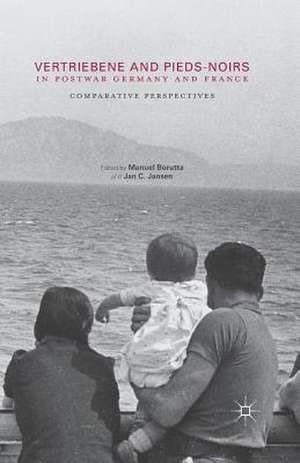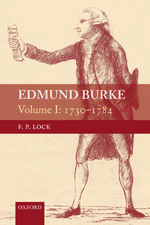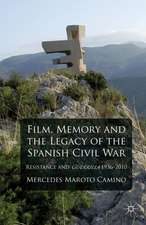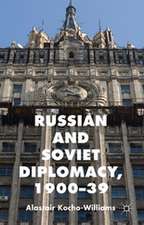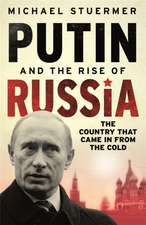Vertriebene and Pieds-Noirs in Postwar Germany and France: Comparative Perspectives
Editat de Manuel Borutta, Jan C. Jansenen Limba Engleză Paperback – 24 mai 2018
| Toate formatele și edițiile | Preț | Express |
|---|---|---|
| Paperback (1) | 281.36 lei 6-8 săpt. | |
| Palgrave Macmillan UK – 24 mai 2018 | 281.36 lei 6-8 săpt. | |
| Hardback (1) | 530.94 lei 6-8 săpt. | |
| Palgrave Macmillan UK – 29 feb 2016 | 530.94 lei 6-8 săpt. |
Preț: 281.36 lei
Nou
Puncte Express: 422
Preț estimativ în valută:
53.84€ • 56.35$ • 44.81£
53.84€ • 56.35$ • 44.81£
Carte tipărită la comandă
Livrare economică 31 martie-14 aprilie
Preluare comenzi: 021 569.72.76
Specificații
ISBN-13: 9781349701506
ISBN-10: 1349701505
Pagini: 300
Ilustrații: XV, 300 p.
Dimensiuni: 140 x 216 x 16 mm
Greutate: 0.37 kg
Ediția:1st ed. 2016
Editura: Palgrave Macmillan UK
Colecția Palgrave Macmillan
Locul publicării:London, United Kingdom
ISBN-10: 1349701505
Pagini: 300
Ilustrații: XV, 300 p.
Dimensiuni: 140 x 216 x 16 mm
Greutate: 0.37 kg
Ediția:1st ed. 2016
Editura: Palgrave Macmillan UK
Colecția Palgrave Macmillan
Locul publicării:London, United Kingdom
Cuprins
Introduction: Comparing Vertriebene and Pieds-Noirs; Manuel Borutta and Jan C. Jansen
PART I: FROM EMPIRE TO NATION-STATE: 1945 AND 1962
1. Legacies of Lebensraum: German Identity and Multiethnicity; Shelley Baranowski
2. The Birth of the Hexagon: 1962 and the Erasure of France's Supranational History; Todd Shepard
PART II: REPATRIATION AND INTEGRATION
3. Assimilation versus Incorporation: Expellee Integration Policies in East and West Germany after 1945; Michael Schwartz
4. The Postcolonial Repatriations of the French of Algeria: An Emblematic Case of a Public Integration Policy; Yann Scioldo-Zürcher
PART III: SELF-ORGANIZATION AND REPRESENTATION
5. The German Expellee Organizations: Unity, Division, and Function; Pertti Ahonen
6. Unity above all? Relationships and Rivalries within the Pied-Noir Community; Claire Eldridge
PART IV: POLITICAL IMPACT AND PARTICIPATION
7. The Political Integration of the Expellees in Postwar West Germany; Frank Bösch
8. The Pieds-Noirs and French Political Life, 1962-2015; Eric Savarese
PART V: COMMEMORATIVE PRACTICES AND EMOTIONS
9. Homeland Corners: Memories, Objects, and Emotions of Expellees in Postwar West Germany; Tobias Weger
10. Pied-Noir Pilgrimages, Commemorative Spaces, and Counter-Memory; Michèle Baussant
PART VI: POLITICS OF REMEMBRANCE
11. Towards a European Memory of Forced Migration? Processes of Institutionalization and Musealization in Germany and Poland; Stefan Troebst
12. Memory Lobbying and the Shaping of 'Colonial Memories' in France since 1990: the Local, the National, and the International; Jan C. Jansen
Conclusions: Comparison – the Way to Understanding; Etienne François
PART I: FROM EMPIRE TO NATION-STATE: 1945 AND 1962
1. Legacies of Lebensraum: German Identity and Multiethnicity; Shelley Baranowski
2. The Birth of the Hexagon: 1962 and the Erasure of France's Supranational History; Todd Shepard
PART II: REPATRIATION AND INTEGRATION
3. Assimilation versus Incorporation: Expellee Integration Policies in East and West Germany after 1945; Michael Schwartz
4. The Postcolonial Repatriations of the French of Algeria: An Emblematic Case of a Public Integration Policy; Yann Scioldo-Zürcher
PART III: SELF-ORGANIZATION AND REPRESENTATION
5. The German Expellee Organizations: Unity, Division, and Function; Pertti Ahonen
6. Unity above all? Relationships and Rivalries within the Pied-Noir Community; Claire Eldridge
PART IV: POLITICAL IMPACT AND PARTICIPATION
7. The Political Integration of the Expellees in Postwar West Germany; Frank Bösch
8. The Pieds-Noirs and French Political Life, 1962-2015; Eric Savarese
PART V: COMMEMORATIVE PRACTICES AND EMOTIONS
9. Homeland Corners: Memories, Objects, and Emotions of Expellees in Postwar West Germany; Tobias Weger
10. Pied-Noir Pilgrimages, Commemorative Spaces, and Counter-Memory; Michèle Baussant
PART VI: POLITICS OF REMEMBRANCE
11. Towards a European Memory of Forced Migration? Processes of Institutionalization and Musealization in Germany and Poland; Stefan Troebst
12. Memory Lobbying and the Shaping of 'Colonial Memories' in France since 1990: the Local, the National, and the International; Jan C. Jansen
Conclusions: Comparison – the Way to Understanding; Etienne François
Recenzii
“This volume nonetheless constitutes a highly valuable collection of essays. It brings together many of the best-known experts on either subject and showcases the increasingly sophisticated, critical, and professional character of research in these fields in recent years.” (Gaëlle Fisher, H-Nationalism, H-Net Reviews, February2018)
“Articles are supremely researched, compelling, and enjoyable to read. … This book provides a rich comparative study, the first of its kind, and certainly the first in English … to address two lesser known populations of migrants who had and continue to have an important role in the national identities of France and Germany. Specialists in migration studies, diaspora and memory studies, as well as the unversed in the history of the Pieds-Noirs and Vertriebene, will find this book useful.” (Amy L. Hubbell, EuropeNow Journal, europenowjournal.org, April, 2017)
“Articles are supremely researched, compelling, and enjoyable to read. … This book provides a rich comparative study, the first of its kind, and certainly the first in English … to address two lesser known populations of migrants who had and continue to have an important role in the national identities of France and Germany. Specialists in migration studies, diaspora and memory studies, as well as the unversed in the history of the Pieds-Noirs and Vertriebene, will find this book useful.” (Amy L. Hubbell, EuropeNow Journal, europenowjournal.org, April, 2017)
Notă biografică
Manuel Borutta is Assistant Professor for Mediterranean history at the Ruhr-University Bochum in Germany. Among his recent publications are A Colonial Sea: The Mediterranean, 1798-1956 (2012, co-editor with Sakis Gekas), and Antikatholizismus: Deutschland und Italien im Zeitalter der europäischen Kulturkämpfe (2011).
Jan C. Jansen is Research Fellow at the German Historical Institute in Washington, DC, USA. He is the author of Erobern und Erinnern: Symbolpolitik, öffentlicher Raum und französischer Kolonialismus in Algerien 1830-1950 (2013) and co-author, with Jürgen Osterhammel, of Kolonialismus: Geschichte, Formen, Folgen (2012) and Dekolonisation: Das Ende der Imperien (2013).
Jan C. Jansen is Research Fellow at the German Historical Institute in Washington, DC, USA. He is the author of Erobern und Erinnern: Symbolpolitik, öffentlicher Raum und französischer Kolonialismus in Algerien 1830-1950 (2013) and co-author, with Jürgen Osterhammel, of Kolonialismus: Geschichte, Formen, Folgen (2012) and Dekolonisation: Das Ende der Imperien (2013).
Textul de pe ultima copertă
After 1945 and 1962, Germany and France received millions of refugees and expellees from Middle and Eastern Europe and from North Africa. Bringing together leading international scholars from both fields, this volume compares one of the largest instances of 'ethnic cleansing' – the Germans from the East (Vertriebene) – with the most important case of decolonization migration – the French repatriates of Algeria (pieds-noirs). By shifting the focus away from the origins and forms to the aftermath of these two examples of mass migration, the book explores to which extent postwar Europe was shaped by the integration of migrants. How did this process impact on the definition of citizenship and the construction of the welfare state in postwar Germany and France? How did it alter the associational and political landscape of both countries? Which marks did it leave on the public memory of crucial chapters in their national histories?
